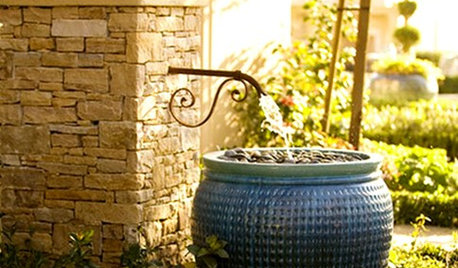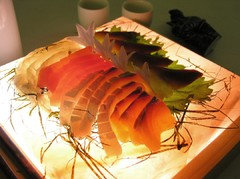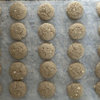Uses and abuses of Pasta Water
emerogork
6 years ago
last modified: 6 years ago
Featured Answer
Sort by:Oldest
Comments (76)
annie1992
6 years agoemerogork
6 years agoRelated Discussions
Boiled pasta and potato water as fertilizer?
Comments (2)We do this regularly. Not sure how much fertilizer value there is in it, but it has to be some and we live in a dry area. So yes, pasta water and water from steaming veggies gets used to water the plants near the kitchen. Why not? Just make sure there is not too much salt in it though....See MoreRe-using a pasta sauce jar?
Comments (61)Linda Lou, I wonder if we "scrub" those bumps off? I use a #8 Griswold for most frying and if I need a larger one, I use my Martin Stove and Range Company skillet for which I have a lid. I think the Martin Company went out of business in the early 1940's, having started in the early 1900's. Don't know the year of my Griswold either. But, they have both been around for many decades. In all those years, both have been scrubbed many times with some pretty old fashioned pot scrubbers. "Elbow grease" was never spared at the kitchen sink in the past. Maybe a few thousand scrubs with a steel pot scrubber kinda takes off those bumps. Just a wild speculation. Jim in So Calif...See MoreHow long can I "hold" cooked pasta in its cooking water?
Comments (9)The latter. From rolling boil cook for two minutes then drain, shock in ice water, drain, stir in just enough olive oil to coat, put in fridge until needed. Supposedly can be held for up to six hours, but I've never gone that long. It can cook more quickly than expected after that, so start checking after a minute or two. Another method which I've never tried is a cold soak. Soak the pasta in cold water anywhere from 1.5 to 4 hours, pull it out and cook as needed. Supposedly this pasta only takes a minute to cook. Are you anticipating cooking individual servings as the guests arrive? That's the only reason I'd see for using either of these methods. Either way you have to boil the pasta, so unless you want to feed them the moment they walk in the door what does it matter if the pasta takes one minute to cook or twelve? If it's a sit-down dinner I'd just have a big pot of water waiting at barely a simmer so that you can bring it to a boil quickly when needed....See MoreDo you use a colander or tongs to drain pasta? (recipe included)
Comments (32)I was cooking pasta with a friend this summer on holiday, and we were discussing all this stuff. He is of Italian heritage so considers cooking his birthright, LOL. He strongly disapproved of putting oil in the water or on the pasta after draining it. He said the sauce wouldn't "stick" as well with the oil. I believe in oil. I put a little oil and mix it into the drained pasta to prevent sticking. It helps to put it in the pasta water also. (I don't care what Alton Brown says about THAT!) My sauces have no problem adhering to the pasta afterwards. Viva La Pasta! (Lou, I have about 10 folded up post-it notes in my purse as we speak!)...See Moresleevendog (5a NY 6aNYC NL CA)
6 years agolindac92
6 years agocolleenoz
6 years agolast modified: 6 years agoplllog
6 years agosleevendog (5a NY 6aNYC NL CA)
6 years agolast modified: 6 years agoci_lantro
6 years agoJasdip
6 years agolast modified: 6 years agoemerogork
6 years agoplllog
6 years agolast modified: 6 years agoemerogork
6 years agocarolb_w_fl_coastal_9b
6 years agoemerogork
6 years agolindac92
6 years agomonarda_gw
6 years agofoodonastump
6 years agowritersblock (9b/10a)
6 years agolast modified: 6 years agoemerogork
6 years agowritersblock (9b/10a)
6 years agolast modified: 6 years agomonarda_gw
6 years agocarolb_w_fl_coastal_9b
6 years agoemerogork
6 years agosleevendog (5a NY 6aNYC NL CA)
6 years agoplllog
6 years agolast modified: 6 years agodcarch7 d c f l a s h 7 @ y a h o o . c o m
6 years agoannie1992
6 years agomonarda_gw
6 years agomonarda_gw
6 years agoCarol Baker
6 years agodcarch7 d c f l a s h 7 @ y a h o o . c o m
6 years agolast modified: 6 years agowritersblock (9b/10a)
6 years agolast modified: 6 years agoemerogork
6 years agodcarch7 d c f l a s h 7 @ y a h o o . c o m
6 years agolast modified: 6 years agolindac92
6 years agojerzeegirl (FL zone 9B)
6 years agomonarda_gw
6 years agowritersblock (9b/10a)
6 years agoCarol Baker
6 years agoemerogork
6 years agoCarol Baker
6 years agoplllog
6 years agomonarda_gw
6 years agoemerogork
6 years agoplllog
6 years agoci_lantro
6 years agoshuffles_gw
6 years agoCarol Baker
6 years agoCarol Baker
6 years ago
Related Stories

SAVING WATER11 Ways to Save Water at Home
Whether you live in a drought-stricken area or just want to help preserve a precious resource, here are things you can do to use less water
Full Story
GREEN BUILDINGJust Add Water: Rain Barrel Magic
Take your rainwater storage from practical to beautiful with a new breed of design-friendly rain barrels
Full Story
KITCHEN DESIGNUsing White Marble: Hot Debate Over a Classic Beauty
Do you love perfection or patina? Here's how to see if marble's right for you
Full Story
KITCHEN DESIGNHow to Choose and Use Ecofriendly Kitchen Appliances
Inefficient kitchen appliances waste energy and money. Here's how to pick and use appliances wisely
Full Story
FEEL-GOOD HOME12 Very Useful Things I've Learned From Designers
These simple ideas can make life at home more efficient and enjoyable
Full Story
LIFEThe Polite House: How Can I Kindly Get Party Guests to Use Coasters?
Here’s how to handle the age-old entertaining conundrum to protect your furniture — and friendships
Full Story
COLORS OF THE YEAR10 Ways to Use Classic Blue, Pantone’s 2020 Color of the Year
This calming hue, pulled from the sky at dusk, is meant to reassure in a tumultuous time
Full Story
THE ART OF ARCHITECTUREFinding the Perfect Home for a New House
Sun, soil, water, topography and more offer important cues to siting your house on the land
Full Story
LANDSCAPE DESIGN15 Great Ideas for a Lawn-Free Yard
End the turf war for good with hardscaping, native grasses and ground covers that save water and are easier to maintain
Full Story
HOUZZ PRODUCT NEWSHow to Deal With Homeowners Who Text Too Much
Unless it’s an emergency, pros advise setting firm boundaries and using technology to make communication more efficient
Full Story0









Carol Baker